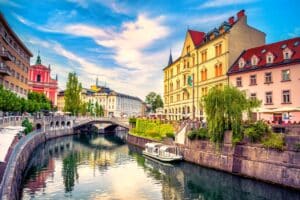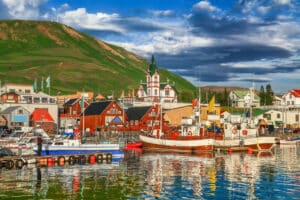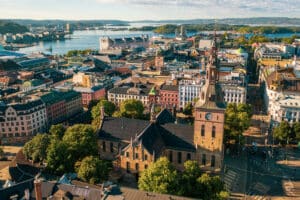New Zealand is a geological wonder that rose from the sea through volcanic activity millions of years ago, creating a stunning landscape that draws in over 500,000 visitors monthly.
Here, the primary concern is navigating the wild outdoors, not worrying about crime. Serious offenses exist but are lower compared to many other places.
So, what does this mean for tourists? Well, the good news is that visitors generally feel as safe as the locals. The vibe is positive all around!
But every place has its quirks, right? So, while New Zealand is a fantastic destination, it’s always good to be aware of a few caveats.
Are you planning a last minute trip to New Zealand? We’ve put together all the resources you’ll need for a fun & safe travel:
🛌 Best & Safest Places to Stay in New Zealand:
👉 Park Hyatt Auckland – Sea view, Key card access, Garden
👉 Fable Dunedin – Facilities for disabled guests, Room service, Restaurant
👉 The Chamberson – Facilities for disabled guests, Free WiFi, Private parking
👉 Galaxy Boutique Hotel – Room service, Free WiFi, Non-smoking rooms
⛱️ Fun Activities & Tours in New Zealand:
👉 Ziplining Forest Adventure – The Original Canopy Tour Rotorua
👉 Rotorua Rafting – Kaituna River White Water Rafting
👉 Milford Sound Scenic Fly-Cruise-Fly departing Queenstown
🚗 Best & Safest New Zealand Transportation Services:
👉 Airport Pickup Service – Welcome Pickups
👉 Rent a Car – DiscoverCars
🙏 Stay Safe While Travelling:
👉 Safetywing (for medical insurance)
👉 VisitorsCoverage (for trip insurance)
Is New Zealand Safe?

New Zealand is one of the safest countries out there, and it’s not just our opinion—international rankings vouch for it.
According to the Global Peace Index, New Zealand grabs the silver medal as the second-safest country globally, right after Iceland. The International Corruption Index puts New Zealand as the second least-corrupt country in the world, just behind Denmark. Wellington, the capital of New Zealand is the seventh safest city globally, surpassing New York , Barcelona , London , and Paris .
New Zealand’s not just safe—it’s super safe. Here’s the scoop:
- International travel advisories: Level One safety, practice ‘Normal Precautions’
- Crime rating: 47.81, low to moderate
- Most common crimes: Theft and burglaries
- High-crime areas: Central Business District in Auckland, and Courtenay Place, Willis Street, and Vivien Street in Wellington
- Public transportation safety: Safe, but watch out for potential pickpockets
- Safety walking alone during the day: High
- Safety walking alone during the night: Moderate
- Road safety: Well-maintained and safe to drive, but be cautious while driving on mountain roads and during extreme weather conditions, and keep an eye out for wild animals crossing the road
- Beach safety: Some beaches have dangerous tides and waves or are contaminated, pick beaches with lifeguards around and swim in designated safe areas
- Common natural disasters: Possibility of volcanic eruptions, earthquakes, tsunamis, hurricanes, landslides, and floods
- Carbon monoxide: Be cautious of carbon monoxide poisoning; pick a hotel that has a CO detector installed or bring a portable one
- Police: Approachable and friendly, glad to help in times of need
- Medical care quality: High-quality, and you won’t be charged for minor emergencies
Travel Advisory for New Zealand
The United States, Canada, United Kingdom, and Australia all give New Zealand a Level One travel advisory—just practice standard precautions as you would at home.
But, like anywhere, New Zealand has its share of crime. Petty crime like pickpocketing occurs, especially in big cities. Travel advisories reveal that theft tends to target hotel rooms, tourist spots, recreational areas, and vehicles.
Terrorism is rare, but there have been incidents, like the 2019 Christchurch case. Authorities urge visitors to remain aware in public spaces, as you never know when an attack might happen.
Nature takes the spotlight in advisories. Earthquakes are a constant risk, and tsunamis could hit any part of the coastline. Active volcanoes add to the mix—volcanic alerts might mean a quick evacuation. Tourists also need to watch out for fast-changing weather, especially in remote areas.
So, nothing too scary, just good to be in the know! Take the advice of the international travel advisories and be prepared for whatever comes your way in New Zealand.
A Comprehensive Look at New Zealand Crime Rates
The crime rating in New Zealand is 47.81, which is low to moderate.
The year 2020 brought New Zealand a total of 265,162 reported crimes—27% were crimes against people, while 73% were crimes against property.
The most common property crime is theft, but what’s pretty cool is that the numbers have dropped by 10.1% from 2019, translating to 15,216 fewer incidents!
Here’s additional relief for tourists: violence is the least common crime in New Zealand, and homicide rates are low. In 2020, the homicide rate was 0.7 cases per 100,000 population.
However, it’s always good to be cautious, especially around areas known to be dangerous, such as the Central Business District in Auckland, and Courtenay Place, Willis Street, and Vivien Street in Wellington.
| Safety Concerns | Crime Rate | Status |
| Overall Crime Level | 51.24 | Moderate |
| Increase in Crime (Past 3 Years) | 70.53 | High |
| Home Break-Ins and Thefts | 47.71 | Moderate |
| Mugging and Robbery | 39.50 | Low |
| Car Theft | 45.52 | Moderate |
| Theft from Vehicles | 51.74 | Moderate |
| Personal Attacks | 42.81 | Moderate |
| Verbal Insults | 46.27 | Moderate |
| Racial, Ethnic, Gender, or Religious-Based Attacks | 33.23 | Low |
| Drug Use and Dealing | 59.65 | Moderate |
| Property Crimes (Vandalism and Theft) | 57.07 | Moderate |
| Violent Crimes (Assault and Armed Robbery) | 46.16 | Moderate |
| Corruption and Bribery | 30.18 | Low |
| Safety Walking Alone in Daylight | 70.21 | High |
| Safety Walking Alone at Nighttime | 41.13 | Moderate |
Police Presence in New Zealand
The New Zealand Police play a vital role in the community. Their mission is clear — prevent crime, enhance public safety, apprehend offenders, and maintain law and order.
As of 2023, the New Zealand Police consists of around 15,000 dedicated officers serving on land, sea, and in the air. Each year, they respond to a staggering 1.3 million events, which includes over 925,000 emergency calls and more than 743,000 non-emergency calls.
No matter the situation, the New Zealand police are ready to assist. Whether you’re feeling unsafe, lost, or just need directions, they should be your first point of contact. New Zealanders are known for their welcoming and trusting nature, and the police officers are no exception!
Public Transportation Safety in New Zealand
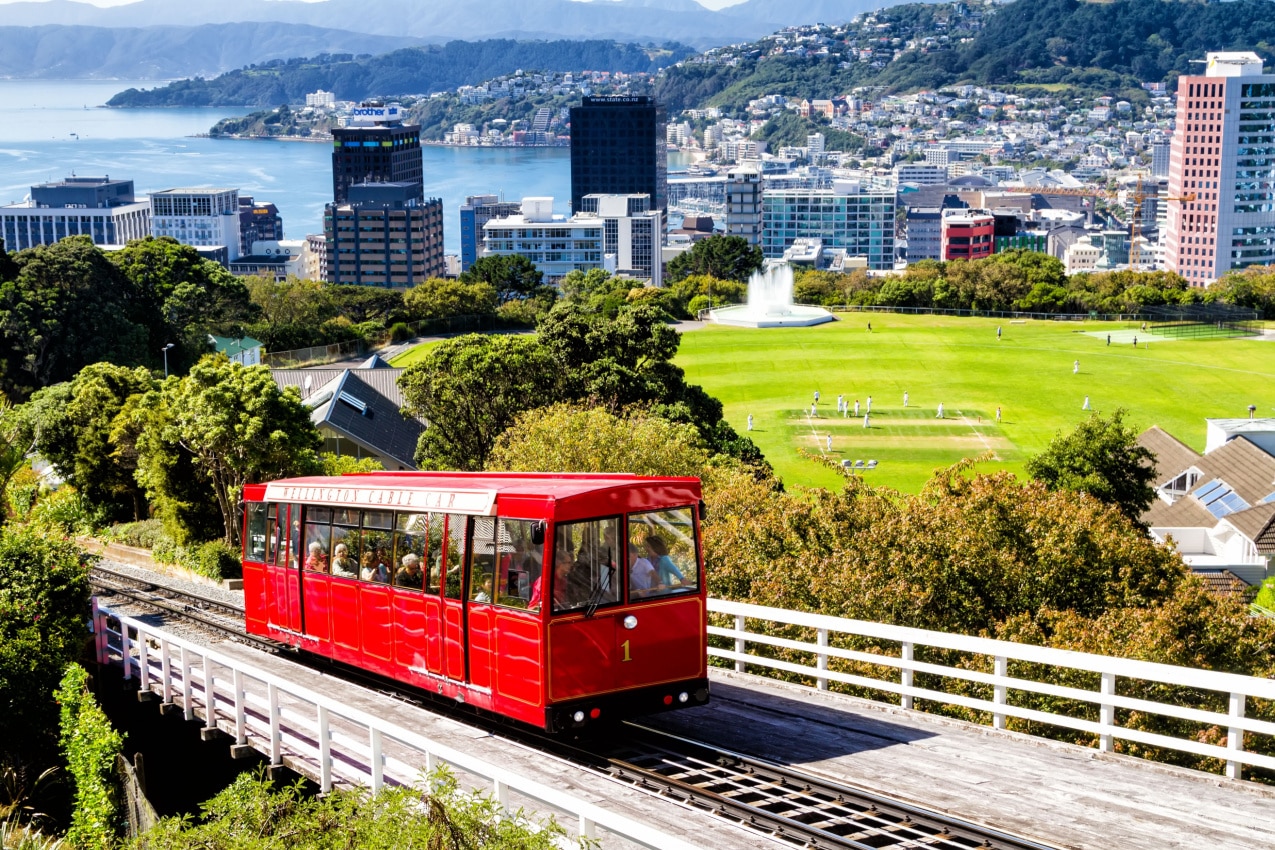
Public transportation in New Zealand is reliable and safe. In big cities like Auckland, Wellington, and Christchurch, you’ve got buses, trains, and ferries.
Petty crimes like pickpocketing can happen, but that’s pretty standard across the world. So keep an eye on your belongings and you’re all good. Beyond that, there’s not much else to worry about.
Check out the regional public transport timetables so you won’t end up missing or waiting for your ride for too long.
Road Safety in New Zealand
The Canadian travel advisory for New Zealand gives a thumbs-up on the overall road safety throughout the country. Still, there are three safety concerns you need to be aware of: mountain roads, extreme weather conditions, and wandering animals crossing the road.
Most roads are in good shape, but some mountain roads might be unpaved and lack safety barriers. If you come across these, take it slow and avoid speeding.
Also, no matter how safe the road looks, snow, ice, fog, rain, and strong winds can make driving risky. Check the weather forecast for your driving route and reconsider your plans if conditions are extreme.
Watch out for wandering animals, especially in rural areas. Dairy herds often cross main roads at milking time, posing a risk to your car, everyone inside, and the animal if you aren’t cautious enough.
Overall, there’s not much else to worry about in terms of road safety in New Zealand. Just remember to use GPS navigation and keep an eye on your fuel level.
Medical Care Quality in New Zealand
New Zealand has a great healthcare system, ranking 17th in the 2022 World Index of Healthcare Innovation. The first spot goes to Switzerland .
Here are the best hospitals in New Zealand:
- Auckland City Hospital
- North Shore Hospital
- Middlemore Hospital
- Waitakere Hospital
- Greenlane Clinical Centre
- Christchurch Hospital
- Hillmorton Hospital
- St. George’s Hospital
- Burwood Hospital
- Princess Margaret Hospital
- Wellington Hospital
- Kenepuru Hospital
- Hutt Hospital
- Kapiti Health Centre
- Masterton Hospital
New Zealand’s got fast and top-quality care for emergencies. And even if you’re without insurance, public and private hospitals won’t turn you away. But, keep in mind that some wait times in public hospitals can be a bit long.
The ACC (Accident Compensation Corporation) covers accidental injuries for everyone, including visitors. If it’s an accident, ACC’s got your medical bills sorted. For illnesses, though, you’ll need travel insurance to handle the costs. Some of the best travel insurance options for traveling to New Zealand are Faye, Travelex, Generali Global Assistance, and Seven Corners.
Is It Safe to Travel Solo in New Zealand?
Traveling solo in New Zealand is totally safe as long as you stick to the usual safety tips you’d follow anywhere.
For instance, if you’re hitting the bustling nightlife scenes, be aware that Kiwis have a thing for binge drinking, so enjoy yourself, and have a drink or two, but do so in a laid-back manner—we all know that situations under the influence of alcohol can escalate to physical conflict.
Calling an Uber is more reliable for nighttime cruising around town than buses. Apart from Uber, New Zealand also has local taxis that you can call, one of the most famous being Kiwi Cabs and Corporate Cabs—but there are plenty more that you can pick depending on your location.
If you’re venturing into the wild solo, let someone local know your plans, like the staff from your accommodation. You can also text the police on 7233 with your location and travel plans and your information will be stored in a database, ready for the police to access if needed.
If you find yourself in danger during your solo travels, don’t hesitate to dial 111 for the police. While your solo adventure is meant to be safe and enjoyable, it’s always wise to be prepared for the worst-case scenario, just in case!
Perils of Nature: The Risk of Natural Disasters in New Zealand
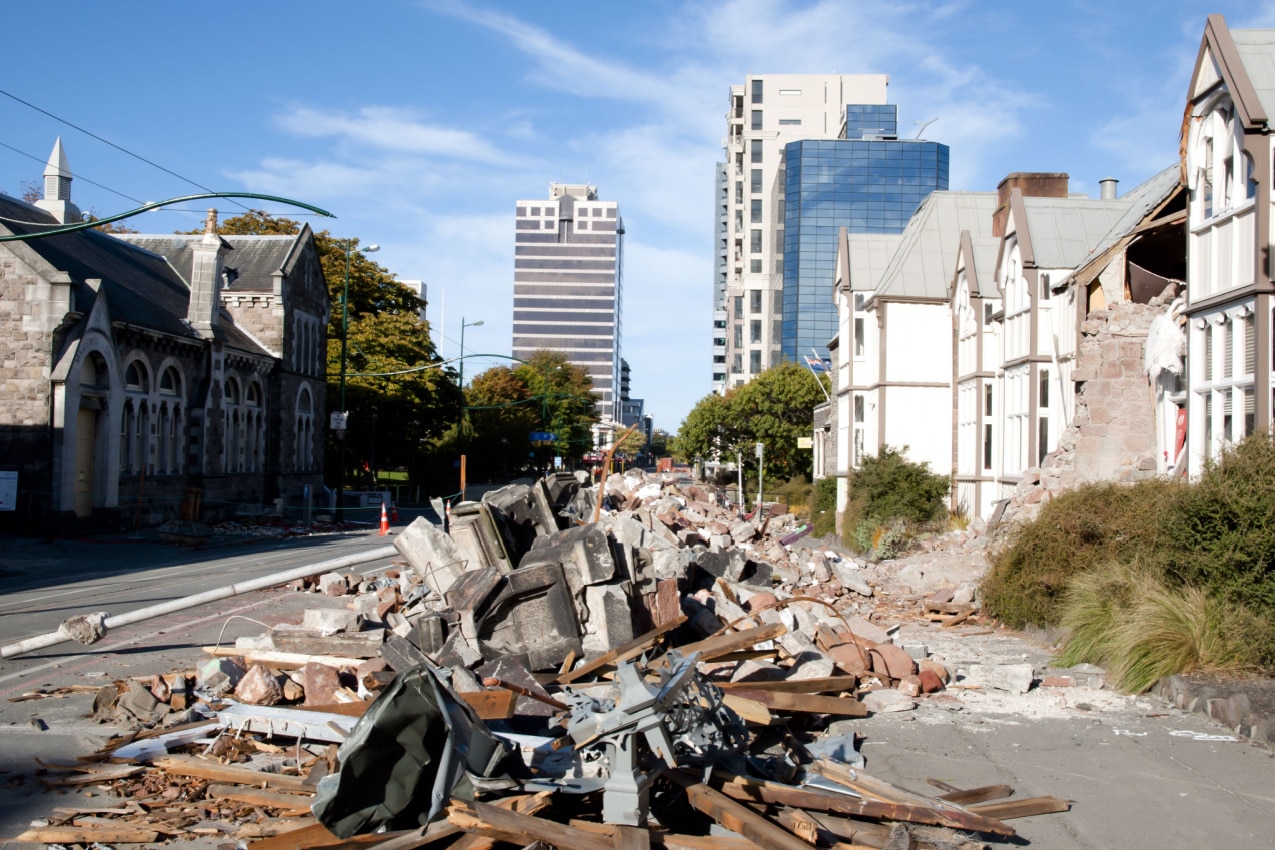
New Zealand’s nature comes with a wild side that can get a bit intense. Buckle up for volcanic eruptions, earthquakes, tsunamis, hurricanes, landslides, and floods.
Volcanic Eruptions
New Zealand boasts twelve volcanic zones, primarily situated on the North Island. Currently, only two of these volcanoes exhibit signs of volcanic activity:
- Whakaari/White Island: Level 2, moderate to heightened volcanic unrest.
- Ruapehu: Level 1, minor volcanic unrest.
The other ten are at Level 0, meaning no volcanic unrest.
The latest eruption was in 2019 on Whakaari/White Island, causing a tragic incident with 16 lives lost. Since then, New Zealand hasn’t had any life-threatening volcanic eruptions, but the potential is there, and the country closely monitors volcanic activity — updates are available on Radio New Zealand, GeoNet, and Civil Defence of New Zealand.
In case of an eruption, listen to the radio, follow emergency services and Civil Defence instructions, and stay indoors. Volcanic ash can be a health risk, especially for those with respiratory issues.
Earthquakes
Earthquakes are a regular thing in New Zealand, with around 14-15,000 occurring each year. Most are too small to notice, but about 150 to 200 are big enough to feel.
In 2023, there were two severe earthquakes in April – one with a magnitude of 5.4 and the other with a magnitude of 5.9, both near Porangahau. The most recent, on Dec 9, measured 4.4 and was 5 km south of Culverden.
The strongest quake in New Zealand happened on October 20th, 1986 in the Raoul region, measuring 8.1 on the Richter scale. It triggered a tsunami, causing more damage and casualties. Thankfully, such powerful earthquakes haven’t occurred recently — but to be 100% sure, remember to follow the seismic activity and plan your trip accordingly.
If an earthquake hits, remember to kneel, cover your head, and hide below something sturdy, like under a table or next to a solid wall.
Tsunamis
In New Zealand, tsunamis can happen when there’s an undersea earthquake or volcanic unrest. There’ve been a total of 24 tsunamis since 1855, causing just one fatality. The biggest one hit in 1931, reaching 15 meters in height. It was caused by a 7.7 earthquake.
Good news for 2023—no tsunamis! Hopefully, the trend will continue into 2024.
Still, you need to be aware that if there’s an earthquake, a tsunami could hit coastal spots fast. Warnings might not come in time, so if you feel a shaky quake for more than a minute, head to higher ground or as far inland as you can. Find the tsunami evacuation zones here, just in case.
Hurricanes
Tropical cyclones aren’t a regular thing in New Zealand, unlike tropical spots like Mexico. But, the country can get the leftovers of tropical cyclones, bringing heavy rain and strong winds that might cause flooding and landslides.
On average, New Zealand has about 2 cyclones a year. The great news is that they often swerve away before reaching New Zealand. The Northland and Southland regions are the ones that feel the tropical leftovers the most.
The cyclone season links up with the summer monsoon, hitting hardest from May to June and October to November. The latest cyclone happened on February 12, 2023, under the name Gabrielle, with winds up to 83 km/h.
If a cyclone warning is up, be aware that these storms move kind of slowly, giving you time to evacuate and find shelter. So keep an eye on the latest hurricane activity, pack the right gear, and have some indoor plans ready just in case!
Landslides
Landslides are very common in New Zealand due to the mountainous landscape, loose volcanic soil, and frequent earthquakes.
In February 2023, Cyclone Gabrielle triggered around 140,000 landslides in New Zealand. Sadly, one landslide at Manukau Heads led to the loss of a firefighter, and there were close calls and lots of damage elsewhere.
If you’re into outdoor activities, be cautious about landslides. If there’s an earthquake, heavy rain, or volcanic action, it’s smart to steer clear of hilly areas or roads near them. When hiking, stick to marked trails, avoid steep slopes, and keep an eye on the weather.
Floods
Floods are the most common natural disaster in New Zealand. From 1968 to 2017, the island dealt with over 80 floods. These floods usually result from heavy rain, rapid snowmelt, or storms, damaging urban spots and places near rivers.
Back in 1938, the Kōpuawhara flood took 21 lives—the most fatalities among the 20th-century New Zealand floods. Fast forward to 2023, Cyclone Gabrielle drenched the North Island, leaving over 6,000 residents out of reach. November 2023 brought more flooding, with 11.8 inches (300mm) of rain isolating rural areas and closing over 20 roads in Tai Rāwhiti and Wairoa.
Unless you’re in the flood zone, flooding shouldn’t concern you. The best thing is to remain updated on weather reports, and if heavy rain’s on the horizon, be ready for evacuation just in case!
Beware the Silent Threat: Carbon Monoxide Poisoning in New Zealand
Carbon monoxide (CO) caused 379 incidents from 2006 to 2014 in New Zealand. It’s a silent gas, toxic and dangerous, so tourists: beware!
Carbon monoxide has no smell, no visible sign, and definitely no taste. It comes from burning fossil fuels like LPG, diesel, petrol, wood, and paper.
You might get exposed to it during heating, cooking, or transport activities, especially if the appliances are poorly ventilated, faulty, or not well-maintained. Misusing appliances, like bringing a barbecue indoors or using a gas oven for heat, may also expose you to dangerous CO levels.
Once you breathe it in, this gas brings on nausea, dizziness, and eventually leaves you unconscious. Long exposure? That can lead to serious consequences like paralysis, brain damage, or worse — loss of life.
The good news is that New Zealand hasn’t suffered any CO incidents in 2023. Plus, most hotels or rentals in New Zealand likely have CO detectors installed in each room. These devices will sound the alarm the second it senses CO in the room, giving you enough time to evacuate.
Nevertheless, it’s smart to double-check with the staff. For extra safety, grab a portable CO detector—better safe than sorry.
Serenity by the Shore: The Safety of New Zealand Beaches
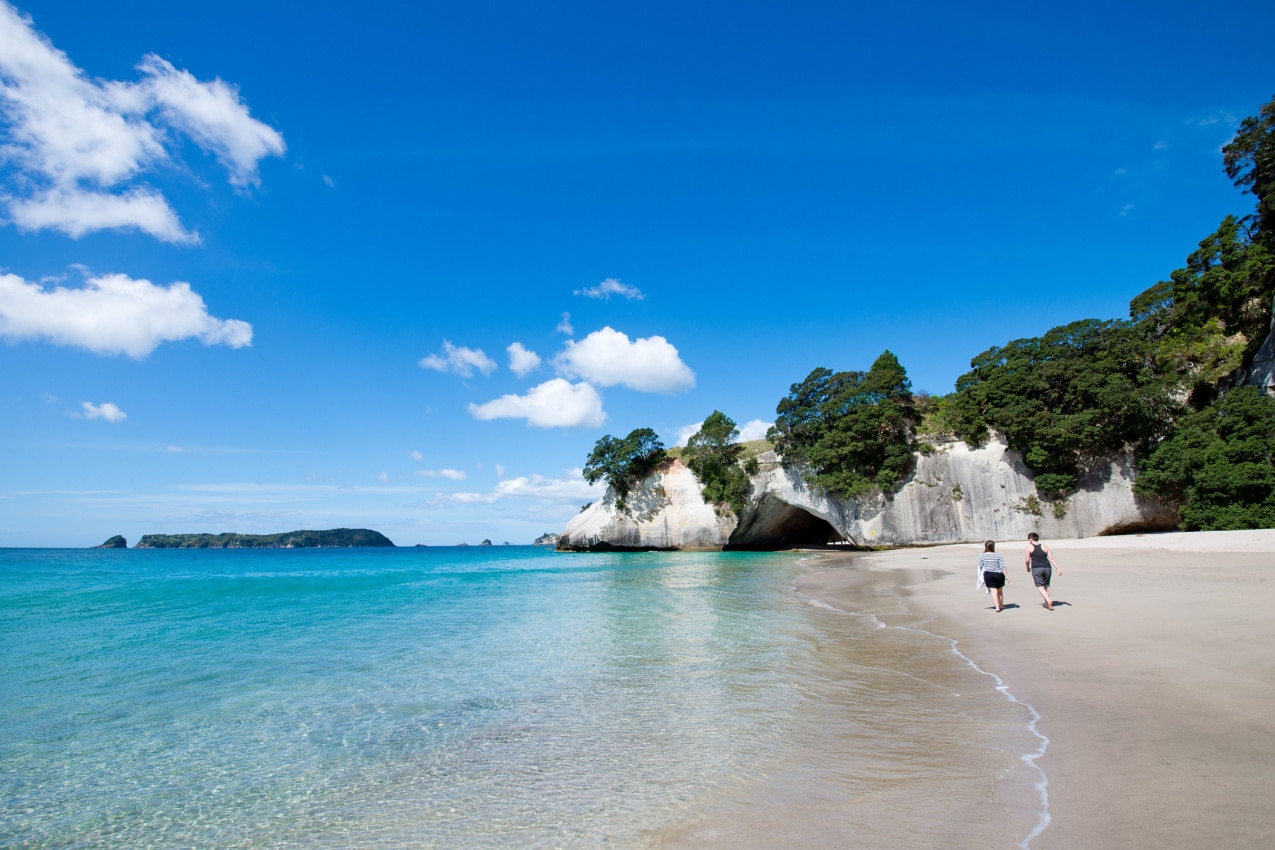
The beaches are New Zealand’s go-to hangout, but not all of them are safe.
SafeSwim offers a map showing which beaches in New Zealand are safe and which ones are a no-go, so before your beach day, check the scene and choose wisely.
When at the beach, look for red and yellow flags—that’s the safest swim spot. Picking a beach with lifeguards is also recommended as they are always keeping an eye out for possible hazards, beachgoers in trouble, and the weather, swell, and tides.
Here are the active warnings set for New Zealand’s beaches as of December 2023:
- Judges Bay: High risk of contamination, don’t swim
- Surfdale and Blackpool: Watch out for cyanobacteria—a bacteria that may cause skin and eye irritation
- Lake Wainamu: Closed due to Cyclone Gabrielle’s damage
- Cathedral Cove: Closed due to rockfall and landslide risk
- Karekare beach: Limited access for locals due to Cyclone Gabrielle’s aftermath
- Midway, Tolaga Bay, and Waikanae Beach: Debris alert, swimming not advised
- Mangawhai Heads and Omaha Beach: Caution, strong onshore winds
- Pakiri Beach and St Kilda Beach: Strong offshore winds, using inflatable and non-powered gear is not recommended
- Omaha, St Kilda Beach, and Waiotahe Beach: Watch out for strong currents
If someone’s in danger in the water and lifeguards are on duty, let them know. If you can’t see any lifeguards, dial 111 for the police.
If you are in the water and get caught in a rip, stay calm and float. Floating buys you time and increases your chances of survival until the lifeguards come to get you. If you don’t know how to float, stay out of the water!
New Zealand Weather Patterns: What to Expect
New Zealand is a diverse mixture of climates. The north is known for its warm subtropical vibes. The south has a cool temperate climate. The mountainous areas are where it gets alpine and super cold.
Since there are many climates in play, let’s focus on the weather in New Zealand’s capital. In Wellington, summers are comfy, winters are chilly and damp, and it’s always a bit breezy. The temperature usually hangs between 38°F (3.3°C) and 74°F (23.3°C) throughout the year.
During the warm season, spanning mid-December to March, daily high temperatures average above 65°F (18.3°C). February is the hottest month, boasting an average high of 68°F (20°C) and a low of 58°F (14.4°C).
As the cool season sets in from June to September, daily high temperatures dip below 56°F (13.3°C). July stands as the coldest month, featuring an average low of 45°F (7.2°C) and a high of 53°F (11.6°C).
For those seeking clear skies, the cloud-free season enters Wellington from mid-January to April, with March being the clearest month and July the cloudiest.
The wet season, spanning from May to October, sees June as the rainiest month with an average rainfall of 3 inches (76 mm). Conversely, January is the driest, with an average rainfall of 1.8 inches (45.72 mm).
Wind enters the stage from September to mid-January, with average speeds exceeding 13.6mph (20.9k/h). October stands out as the windiest month, boasting an average hourly wind speed of 14.6mph (23.4k/h).
In contrast, the calmer time of year extends from mid-January to September, with April being the month with the lowest wind intensity at 12.5mph (20.1k/h).
Monthly Average Temperatures in Wellington
| Month | Fahrenheit (°F) | Celsius (°C) |
| January | 62 | 16.6 |
| February | 63 | 17.2 |
| March | 60 | 15.5 |
| April | 57 | 13.8 |
| May | 54 | 12.2 |
| June | 50 | 10 |
| July | 49 | 9.4 |
| August | 49 | 9.4 |
| September | 52 | 11.1 |
| October | 54 | 12.2 |
| November | 56 | 13.3 |
| December | 60 | 15.5 |
When Is the Best Time to Visit New Zealand?
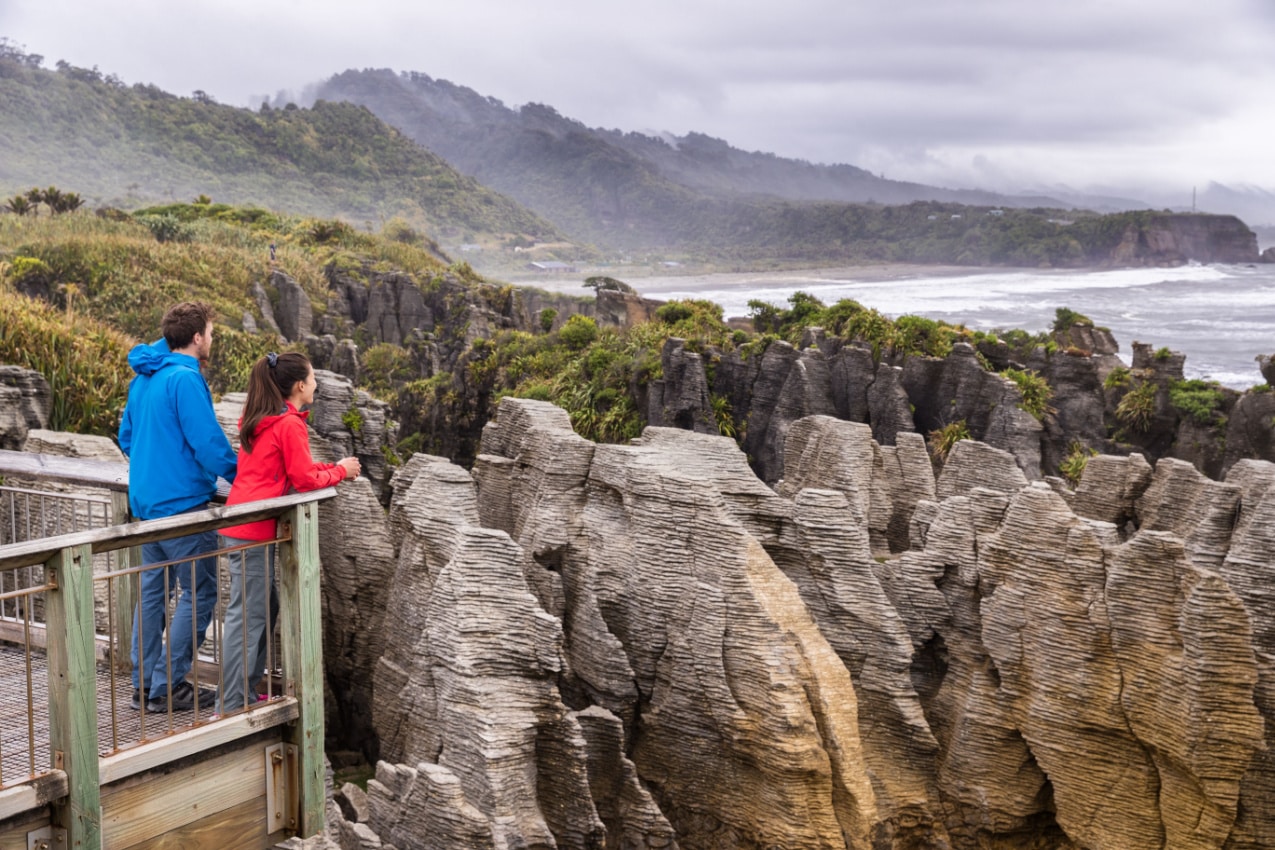
New Zealand’s a gem year-round, but summer (December to early April) steals the spotlight for the best time to visit. This is the time when the weather is at its best, making it perfect for all your outdoor adventures—no worries about harsh conditions ruining your road trips, island hopping, hiking, or beach days.
Now, let’s dive into specific preferences:
Best time for fewer crowds and budget-friendly options (March-May and June-August): Popular spots are quieter in autumn and winter, offering great deals on accommodation and flights—a budget-friendly dream.
Best time for snow sports (June-August): Winter is your go-to if you’re into skiing or snowboarding on the popular ski fields of Queenstown, Wanaka, and the Central Plateau. The highest snowfall is in July and August.
Best time for beach lovers (January-March): Summer months are beach perfection along the North Island’s coastlines. By February, the crowds thin out, perfect for laid-back beach days.
Best time for Lord of the Rings fans (September): September 22nd is “Hobbit Day,” celebrating the iconic filming location near Rotorua. If you’re around Hobbiton, don’t miss this special festivity.
Best time for whale watching (June-August): Migrating pods of humpback, pilot, and blue whales make for an exciting spectacle of the New Zealand shores. You can take a boat tour and check out these majestic creatures up close.
Best time for surfers (December-March): Summer into spring offers the best surf. North Island surfers enjoy warmer waters, while South Island beaches are known to have mighty swells.
Best time for wine tasting (February-May): Fall brings the harvest season in New Zealand. You can explore the country’s wine regions and get a taste of their distinctive wines.
Best time for festivals (December-May): Summer and fall are festival seasons. From music events like Rhythm & Vines to foodie fests like the Marlborough Wine & Food Festival, there’s something for everyone.
No matter when you go, New Zealand has something amazing in store!
How to Stay Safe in New Zealand
- No Hitchhiking: Avoid hitchhiking; you never know who might offer you a ride
- Secure Your Valuables: Keep your valuables secure and leave them at your accommodation
- Watch Your Belongings: Never leave bags, wallets, or phones unattended in public places like airports, restaurants, bus stations, or beaches
- Stay in Well-Lit Areas: If you’re out at night, stick to well-lit places with other people. Avoid shortcuts through parks or alleys
- Talk to Local Centers: Consult staff at local i-SITE Visitor Information Centers or Department of Conservation (DOC) Visitor Information Centers for tips on exploring New Zealand’s bush or mountain areas
- Fitness Matters: Don’t underestimate the walks in the mountains and national parks. Check the fitness level for the area where you plan to hike
- Gear Up for the Outdoors: Have the right clothing, footwear, equipment, and supplies for outdoor activities
- Sun Protection: In sunny weather, the UV rays in New Zealand are strong. Wear a hat and sunscreen
- Take Weather Warnings Seriously: Heed all weather warnings seriously as New Zealand’s weather can be unpredictable
- Emergency Preparedness: If lost, seek shelter and wait. Use a torch or camera flash at night, and place something visible from the sky during the day. New Zealand has skilled search and rescue teams throughout the country
Emergency Numbers
- Police, fire, and ambulance: 111
- Urgent matters: 105
Ready for the Land of the Long White Cloud?
New Zealand is hands-down one of the safest countries globally. Crime is low, society is safe, and the only real safety hiccups might come from extreme weather or the great outdoors.
As it’s the second-safest country in the world, travel advisories from foreign governments give New Zealand a Level One travel advisory — the safest rating.
With all signs pointing to a worry-free visit, what’s left for you is to choose the perfect time to go — though keep in mind that summer is a favorite. Enjoy your New Zealand adventure!

